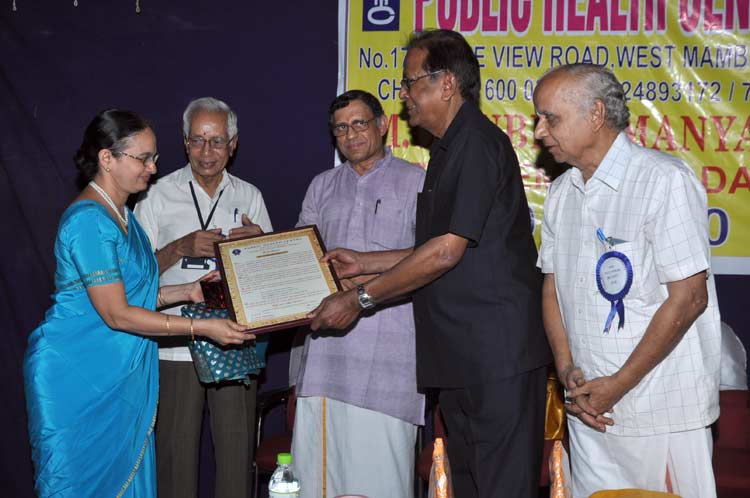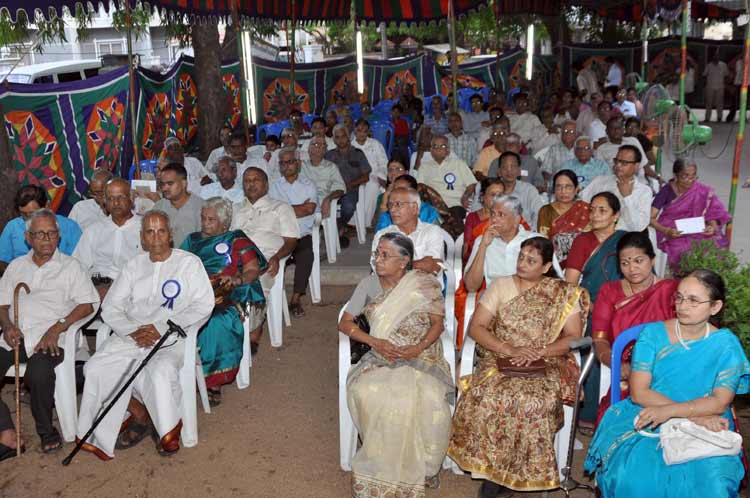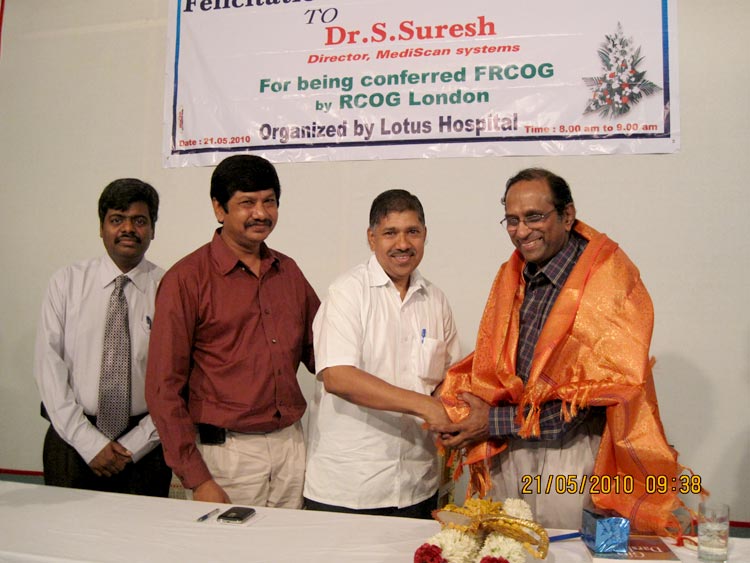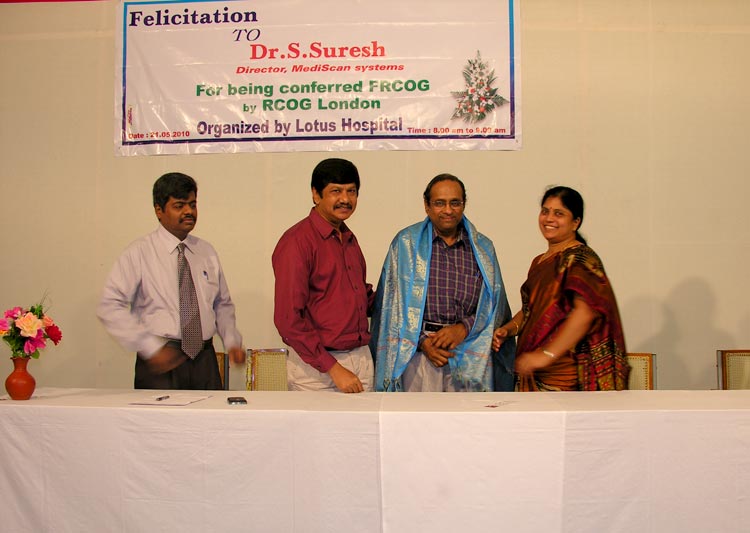|
|
| |
 |
|
| |
|
|
| |
Trophies for MediScan |
|
| |
Contract
All | Expand
All |
|
| |
 1. Prof S Suresh has been awarded 'D.Sc. Honoris Causa' by the TN MGR Medical University
Dear Prof Suresh
It is fantastic to hear that you have been awarded 'D.Sc. Honoris Causa' by the TN MGR medical university. It is an extremely well deserved honour in recognition of your contribution to medicine and the huge volume of work that is being done.
For me and to many many others, you have been a role model and an inspiration for what an individual can achieve if they set their mind to it irrespective of what the system gives or denies them. More importantly your work has shown that we can do this in a fashion that reaches the same system and in fact strengthens it .
Congratulations from all of us at Seethapathy.
Wishing you and the team with you the very best of health, energy and enthusiasm for more work and recognition in the future.
Warm regards
Dr. Uma
|
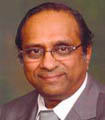 |
| |
 2.
Prof. Suresh S recieves the "Life time achievement award" on 29th February, 2012
| 23 rd convocation of the Tamil Nadu Dr MGR Medical University was held on wednesday 29th February
2012 at 5 P.M at Centenaty Auditorium, University of Madras. Prof S.Suresh recieved the Life time Achievement
Award from Hon Governor of Tamil Nadu Dr K.Rosiah and Hon Minister for Health ,Government of Tamil Nadu.
We wish him many more such endeavours!!! |
 |
| |
 3.
Dr. Sujatha Jagadesh to participate in the ICBDSR meet to be held on 28th
September 2011.
| Dr. Sujatha
Jagadeesh flies to Geneva representing "Birth Defects Registry
of India" (BDRI) to participate in the "International
Clearing house for Birth Defects Surveillance and Research"
(ICBDSR) meet to be held on 28th September, 2011.
We wish her "Bon voyage"... |
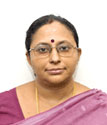 |
ICBDSR
meet to be held on September 28th, 2011. |
 4.
Woman delivered of twins and an abnormal foetus
| A poor couple from Tiruvallur
were blessed with a set of healthy identical twins thanks
to the extraordinary public private partnership between
Fetal Care Research Foundation, MediScan & The Govt.
RSRM Hospital |
|
|
A poor couple from Tiruvallur was referred to MediScan with
a Monochorionic triplet pregnancy with one acardiac acephalic
baby. There was severe polyhydramnios and the risk of losing the
normal babies if untreated was 100%. The option of in-utero therapy
by occlusion of the blood vessel going to the abnormal baby was
discussed and the parents were willing for the procedure. However,
they could not afford the cost -Rs. 70,000. The patient was admitted
at the Govt. RSRM hospital under Dr.Hepsiba and the procedure
was done at MediScan by Prof.S.Suresh, Dr.Indrani Suresh &
Dr. Subapriya K . The pregnancy was closely monitored and the
twin babies weighing 1.9 kg each were delivered by Dr.Hepsiba
at Govt RSRM hospital, Chennai on 12/5/2011. |
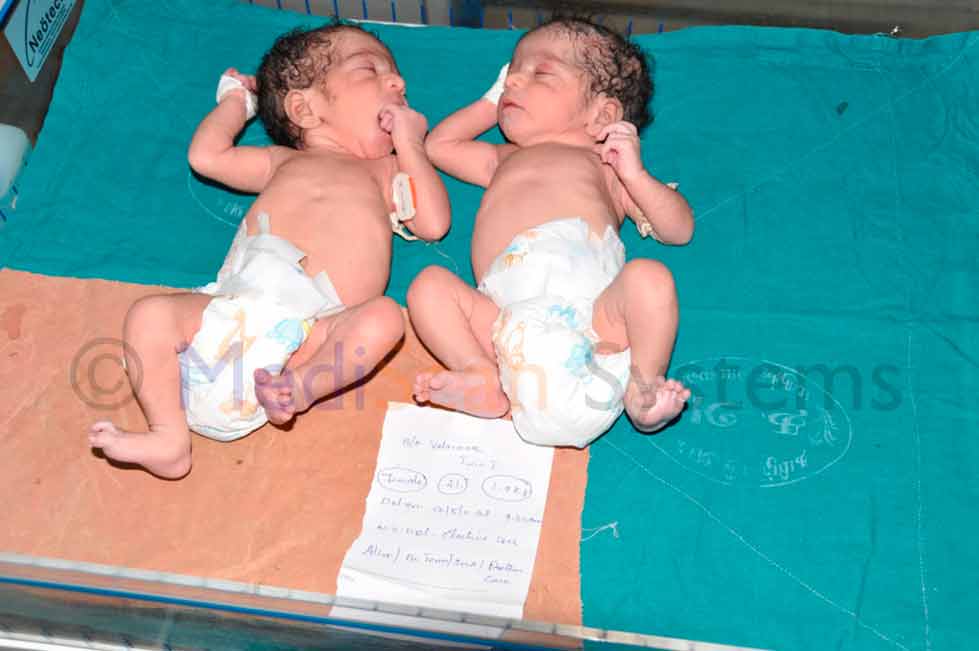 |
Copyrights,
The Hindu dated May 13, 2011 click
here |
 5.
Prof. S. Suresh was awarded the "WORLD DOWN SYNDROME DAY AWARD"
for 2011.
| Downs syndrome international
announced the 2011 World Down Syndrome Day Awards on 21st
March 2011 and Prof. S. Suresh has been given the scientific
award for outstanding contribution for the year 2011, as
a medical professional in the field of Down syndrome. The
award will be given at the 11th World Down Syndrome Congress
to be held in South Africa on 15 - 17 August 2012.
|
|
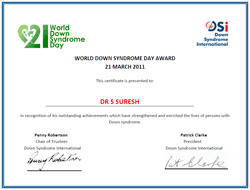 |
| Date: 21st Mar, 2011 |
 6.
BDRI gets International membership in the ICBDSR which was held in Buenos Aires
| The 37th annual meeting
of the International Clearing House for Birth
Defects Surveilance and Research (ICBDSR)
was held in Buenos Aires recently and BDRI's application
for International membership was approved. BDRI will shortly
be providing surveilance data and participating in ICBDSR
projects.
BDRI thanks all its members who have made
this possible and for having supported this national cause
so sincerely. Since BDRI is now an International Registry
the effort would be to go all out in spreading the registry
throughout the length and breadth of the country and more
importantly improving the quality of data by supporting
all anomalies with proper images and pictures. BDRI also
wants to make an all out effort to move more and more towards
online reporting. |
|
|
| Date: 7th Jan, 2010 |
 7.
The Obstetric & Gynaecological Society of Southern India felicitates
Prof. S. Suresh
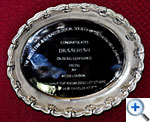 |
The Obstetric & Gynaecological
Society of Southern India felicitates
Prof. S. Suresh |
| The OGSSI (Obstetric & Gynaecological Society of Southern
India) society felicitates Prof. S. Suresh for his FRCOG
by RCOG (Royal College of Obstetrics & Gynaecology) -
London, UK on July 27th, 2010 in a meeting held by
OGSSI at Institute of Obstetrics & Gynaecology Campus,
Egmore, Chennai. |
|
|
| Date: 27th July, 2010 |
 8.
Prof. S. Suresh, Dr. Indrani Suresh and Dr. Uma Ram on "Understanding
the unborn"
Technological advances have had a huge
impact on our lives, especially in the medical field. And
arguably one of the biggest beneficiary has been the pregnant
woman. In times long past, the focus was on the mother:
her health, what she ate, how she felt... With the advent
of the ultrasound and other such advances, the focus shifted
to the baby inside the uterus leading thereby to the rise
of foetal medicine.
One of the pioneers in the field of ultrasound and foetal
medicine in India is Prof. S. Suresh, Director MediScan Systems,
Chennai. He also played a key role in setting up a Birth
Defects Registry of India, setting standards for Down's
syndrome screening, introducing newborn metabolic screening
and training of people in ultrasound from India and abroad.
In recognition of his services in the field, he has been
invited by the Royal College of Obstetricians and Gynaecologists,
U.K., to be a Fellow Honoris Corsa and conferred the FRCOG
in November 2010.
As Prof. S. Suresh, Dr. Indrani Suresh and Dr. Uma Ram discuss
how the advent of the ultrasound changed the way the foetus
was viewed and the range of issues that now dog foetal medicine,
one realises what a crucial step this was. Excerpts from
the conversation:
|
|

|
|
What
we need is a special diploma in obstetric ultrasound. Ultrasound
should be declared as a sub specialty -Prof. S. Suresh |
| Also have a look at "A helping hand
for the foetus" - click here |
|
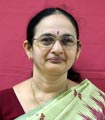 |
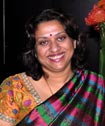 |
| Copyright
© 2010 "THE HINDU" Dated - 4th July, 2010 - click here |
 9.
Dr. Indrani Suresh of MediScan honored by Public Health Centre
|
Public Health
Centre on its golden jubilee year on 22nd May 2010 saluted and
honoured Dr. Indrani Suresh for her continued association with
the centre for more than 25 yrs. The citation said that Dr. Indrani
Suresh belonged to a rare breed of medical practitioners who combined
medical ethos with social thinking and community service.
Dr. Indrani Suresh said she was proud to have been associated
with the Public Health Centre for more than 25 yrs and called
the founder of Public Health Centre Dr. M. C. Subramaniam a true
Gandhian whom any professional should emulate. |
| Date: 22nd May, 2010 |
 10.
Lotus Hospitals, Erode honors Prof. S. Suresh of MediScan
|
In a meeting
organized by Lotus Hospital, Erode on 21st May Prof. S. Suresh was
felicitated by the managing director District governor (Rotary
District 3202) Dr E K Sagadhevan, Dr. E. S. Usha, Dr. S. Eswaramoorthy
and Dr. R. Selvan.
The Tamilnadu IMA President Dr. S. Sukumar adorned a shawl and
felicitated Prof. S. Suresh. Erode IMA President Dr. Madhavan and
EOGS President Dr. Hemalatha Arthur also felicitated him.
|
| Date: 21st May, 2010 |
 11.
Devaki scans, Madurai honors Prof. S. Suresh of MediScan
 |
Devaki scans, Madurai |
| Devaki scans, Madurai honors Prof. S. Suresh of
MediScan as "Thuronocharier of Ultrasound". |
| Date: 10th
May, 2010 |
 12.
Rotary club of Madras felicitates Prof. S. Suresh
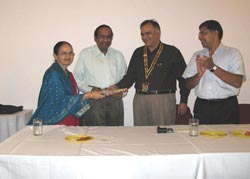
|
 |
| The Rotary Club of
Madras felicitates Prof. S. Suresh of MediScan for being conferred
FRCOG by Royal College of Obstetricians & Gynaecologists. |
| Date: 8th
May, 2010 |
 13.
Chennai Doctor chosen for honour
The Royal college
of Obstetricians & Gynaecologists has invited Chennai-based
Prof. S. Suresh, Director, MediScan Systems, to be its Fellow Honoris
Causa. The award will be conferred at a function in November.
This award is being given to him to acknowledge the highest level
of dedication & achievement in clinical care and support to
the development of women's healthcare services. The appreciation
is for his pioneering work in the field of ultrasound and foetal
medicine. |
| Copyright © 2010
"THE HINDU" Dated - 22nd April 2010 |
 14.
Honors to Prof. S. Suresh
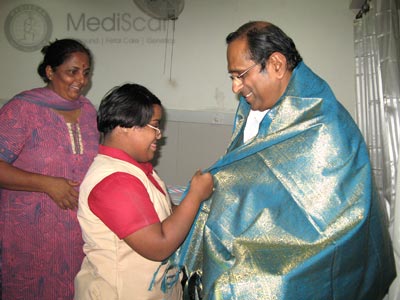
|
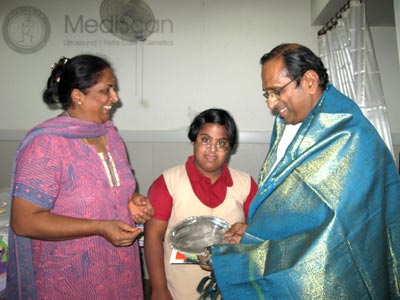 |
| Courtesy:
Down's Syndrome Society of Tamil Nadu |
|
|
| |
|
|
| |
|
|
|











